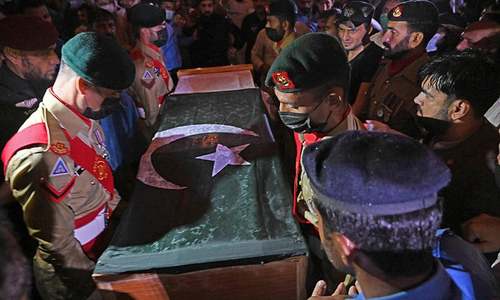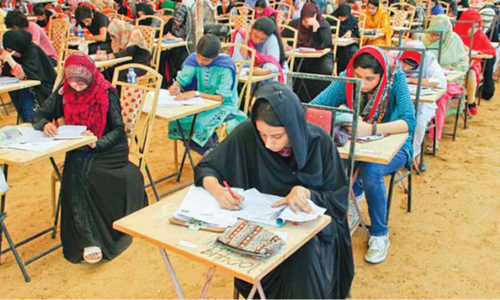ISLAMABAD: Some 11 hours before his death, nuclear scientist Dr Abdul Qadeer Khan had disclosed to Dawn that he would challenge in court the flawed entry tests for admission to medical and dental colleges.
“I am going to file a petition on Monday in Islamabad High Court to challenge a faulty MDCAT (medical students’ admission test) because it has destroyed future of hundreds of thousands of students.”
These were the remarks Dr Khan made on Saturday evening while talking to Dawn on the matter related to results released by the Pakistan Medical Commission (PMC). This showed the amount of concern he had for problems faced by the common man and, in this particular case, the miseries of candidates who were asked by the PMC to ignore the initial results.
He was of the opinion that the government had introduced a faulty Medical and Dental Colleges Admission Test (MDCAT) that endangered the future of medical students in the country.
According to a media report, the PMC announced that around 125,000 candidates — 65 per cent overall — had failed to get the passing marks.
This scribe received Dr Khan’s phone call at 6.28pm on Saturday in which the nuclear scientist said he was quite disturbed because of the future of medical students and, therefore, he decided to challenge the issue in the IHC.
About his health, Dr Khan in a strained voice said he had returned home after having Covid 19 treatment at the hospital, though he was still not feeling well. “I have pain in my whole body,” he added.
As the scientist who made the country an atomic power is no more, it is uncertain whether his family will pursue his petition or not.
Earlier, Dr Khan told Dawn that he was not happy with the present rulers for not inquiring after his health when he was hospitalised due to Covid-19. In his recent letter to incumbent Sindh Chief Minister Murad Ali Shah, Dr Khan had conveyed his displeasure over the federal government’s attitude.
“Such a nice feeling that the PM & CM of Punjab, KPK and Balochistan are waiting to hear good news of my demise,” he wrote.
Dr Khan, born in 1936 in Bhopal, India, saw rise and downfall in his life, but he came in hot water after Pakistan conducted nuclear tests in 1998. Since then, he had to lead a difficult life with what the authorities called “protective” custody at his own E-7 residence along with his Dutch wife Henny Khan.
Beyond exaggeration, Dr Khan can be called “good morning” man for his friends and fans as he used to send good wishes massages before sunrise after offering Fajr prayer. Silence from his cell phone on Sunday was shocking for many, as he could not sprinkle good wishes to people before the news of his demise broke at around 7am.
He will be remembered not only for being the architect of Pakistan nuclear programme but also for his contribution to the education and social welfare sectors. According to his family sources, he and his wife were running more that 100 education and social welfare institutions across the country, especially in remote areas.
Dr Khan had immigrated along with his family to Pakistan in 1947 after partition of the subcontinent. He earned a science degree at Karachi University in 1960 before going to Berlin for studying metallurgical engineering and proceeding to the Netherlands and Belgium to complete advanced studies.
In 1974, he joined Pakistan nuclear programme, dreamt by then prime minister Zulfikar Ali Bhutto, founded the Khan Research Laboratories in 1976 where he served as its chief scientist and director for many years.
When India conducted nuclear tests in 1998, the whole nation was waiting for a robust response from Pakistan and finally under his supervision the nuclear tests were conducted in Chagai, Balochistan.
Dr Khan was a rare national hero who received three top civil awards as recognistion of his services to the country and made its defence insurmountable. They were Hilal-i-Imtiaz that he received in 1989, followed by Nishan-i-Imtiaz once in 1996 and then again in 1999.
He is the author of many research papers and publications. Some of them are: In 1972 Advances in Physical Metallurgy (in English, German and Dutch), Metallurgical Thermodynamics and Kinetics (in English, German and Dutch) in 1983, and Dr A.Q. Khan on science and education in 1997.
Published in Dawn, October 11th, 2021














































